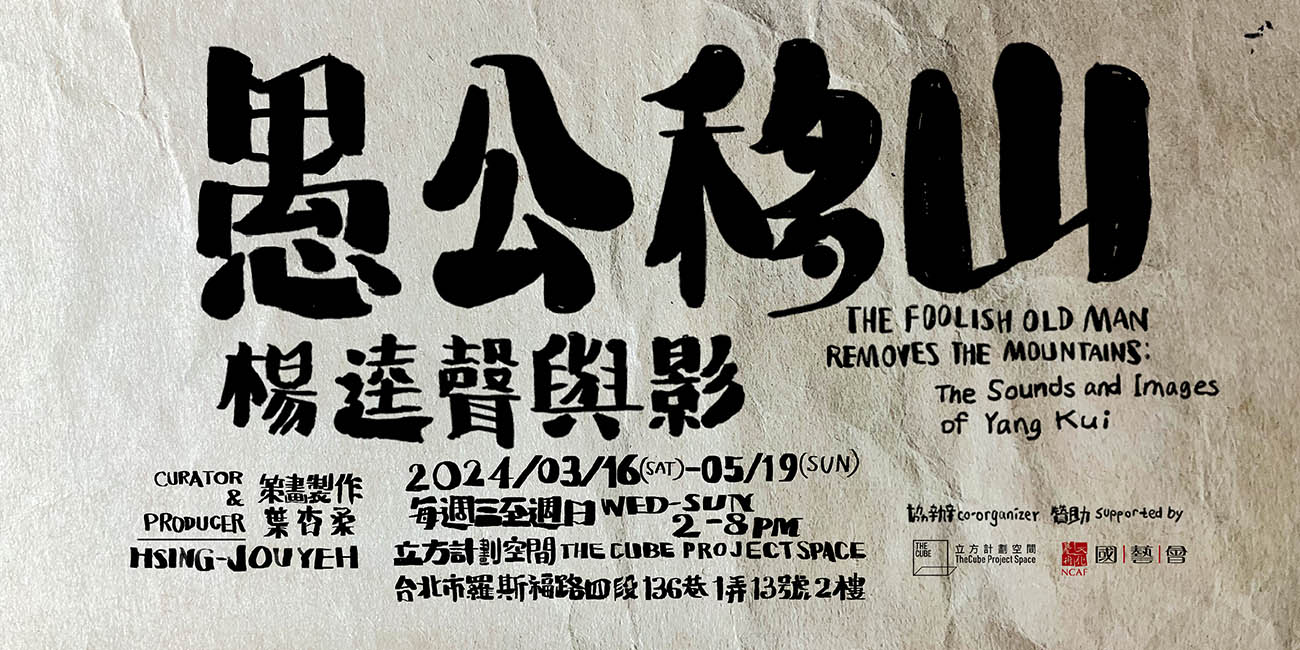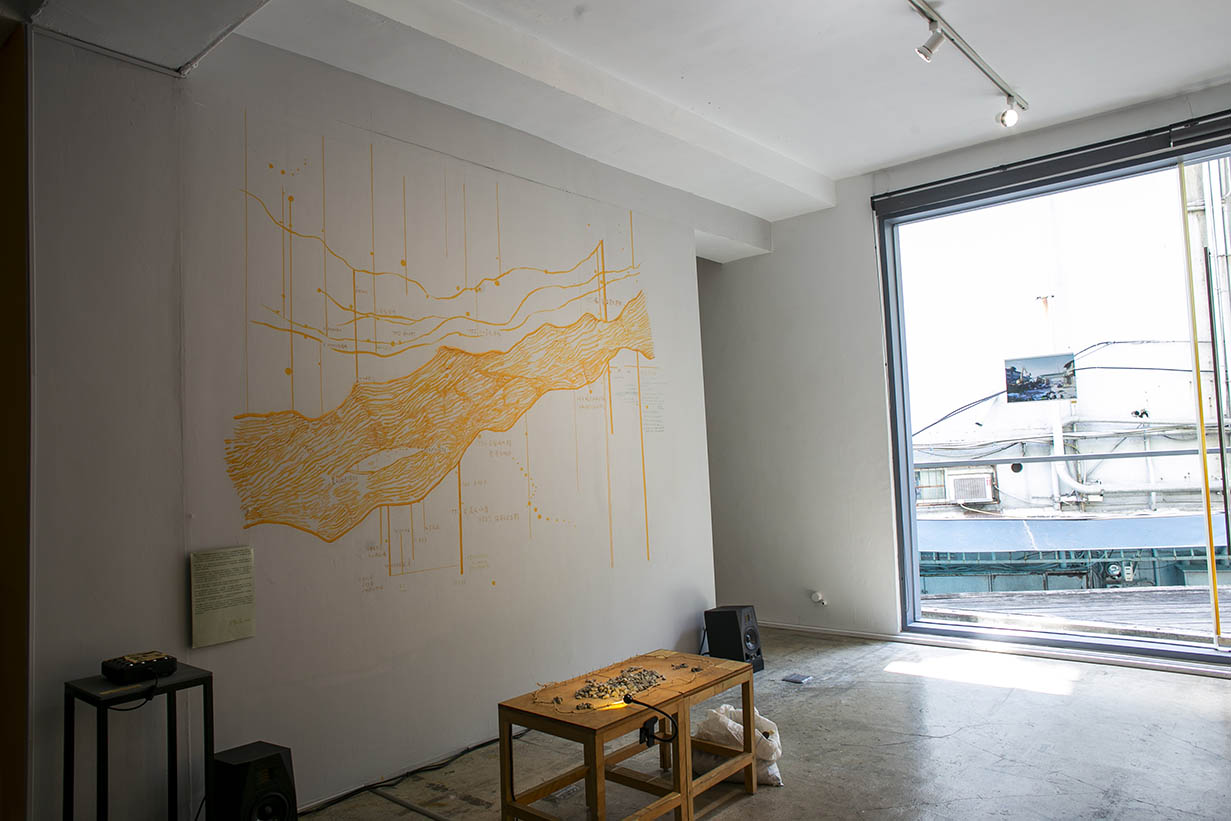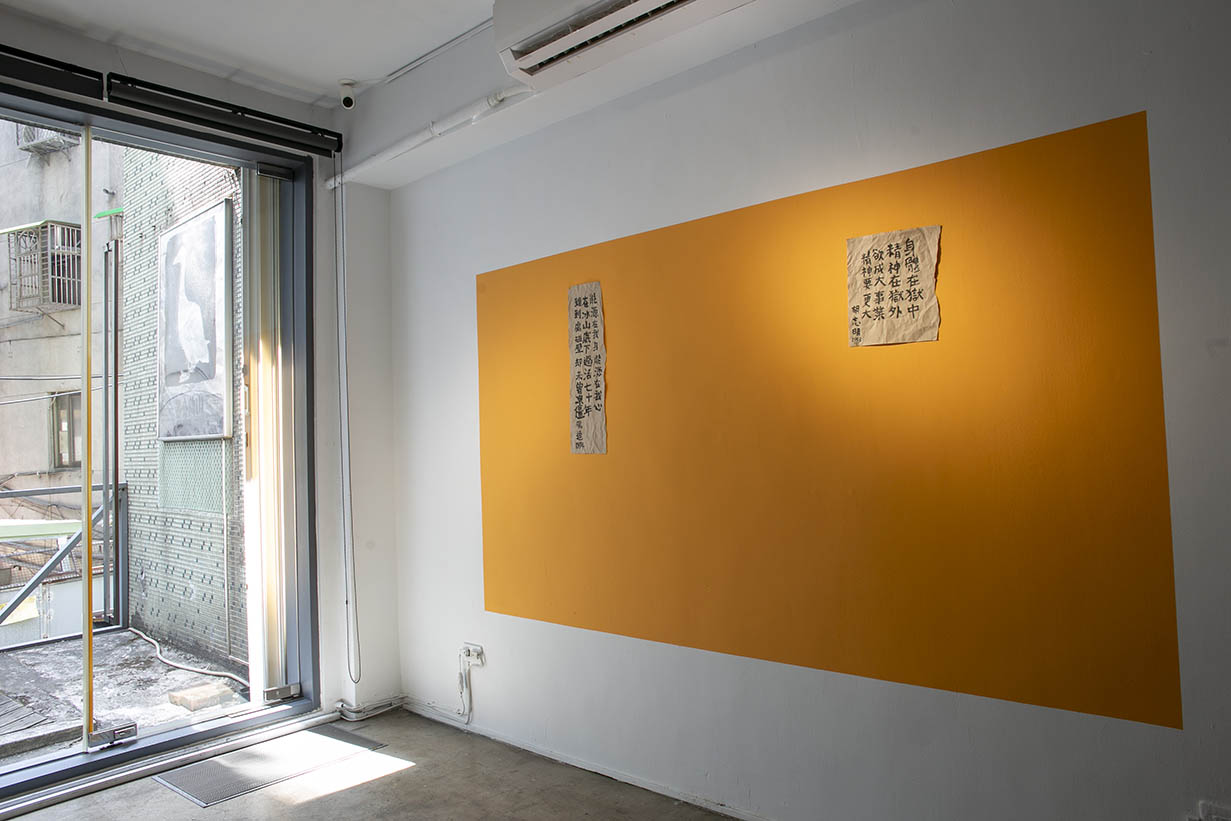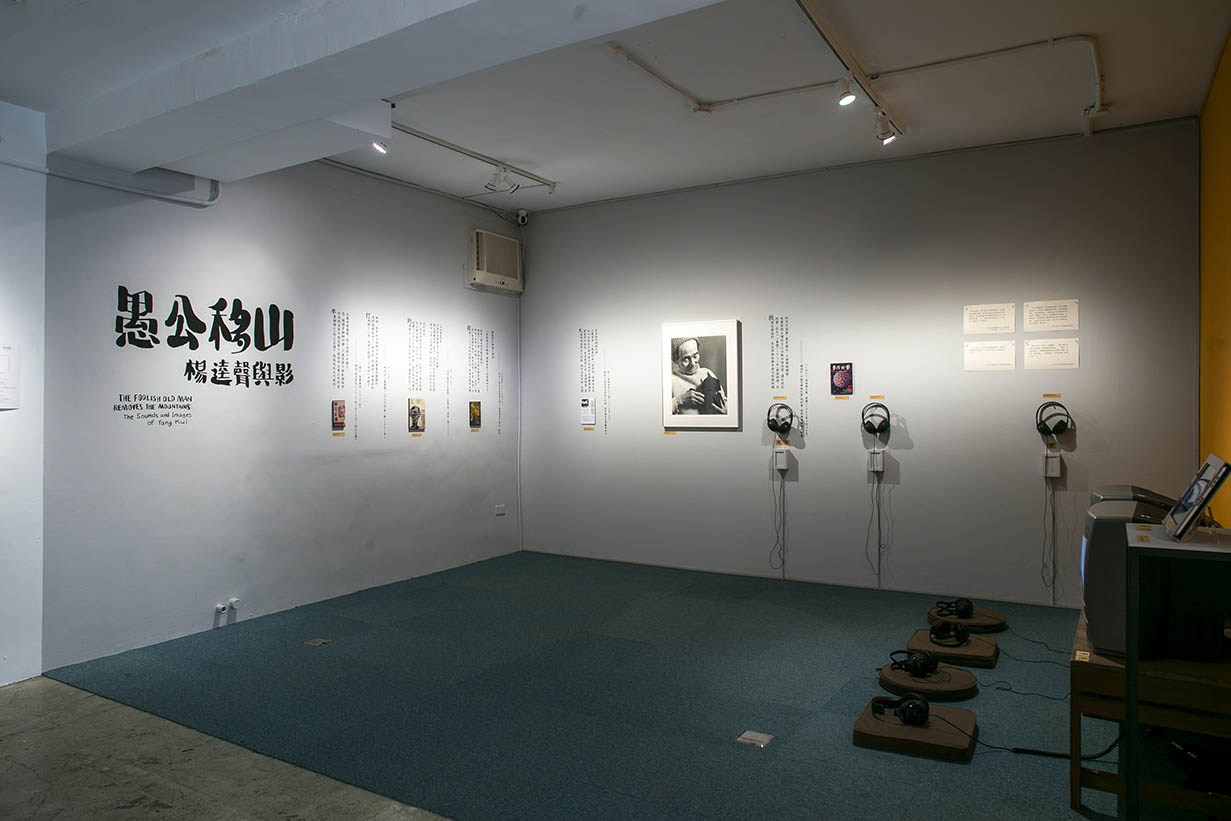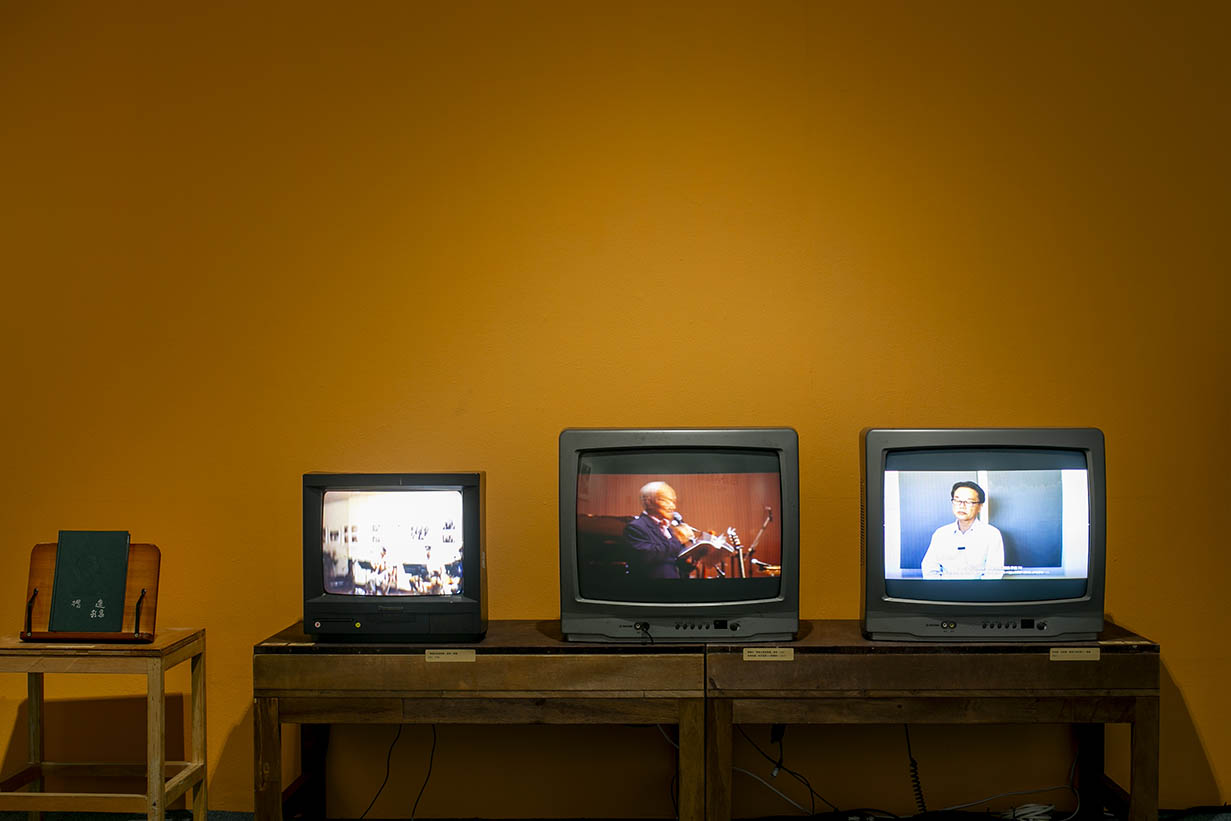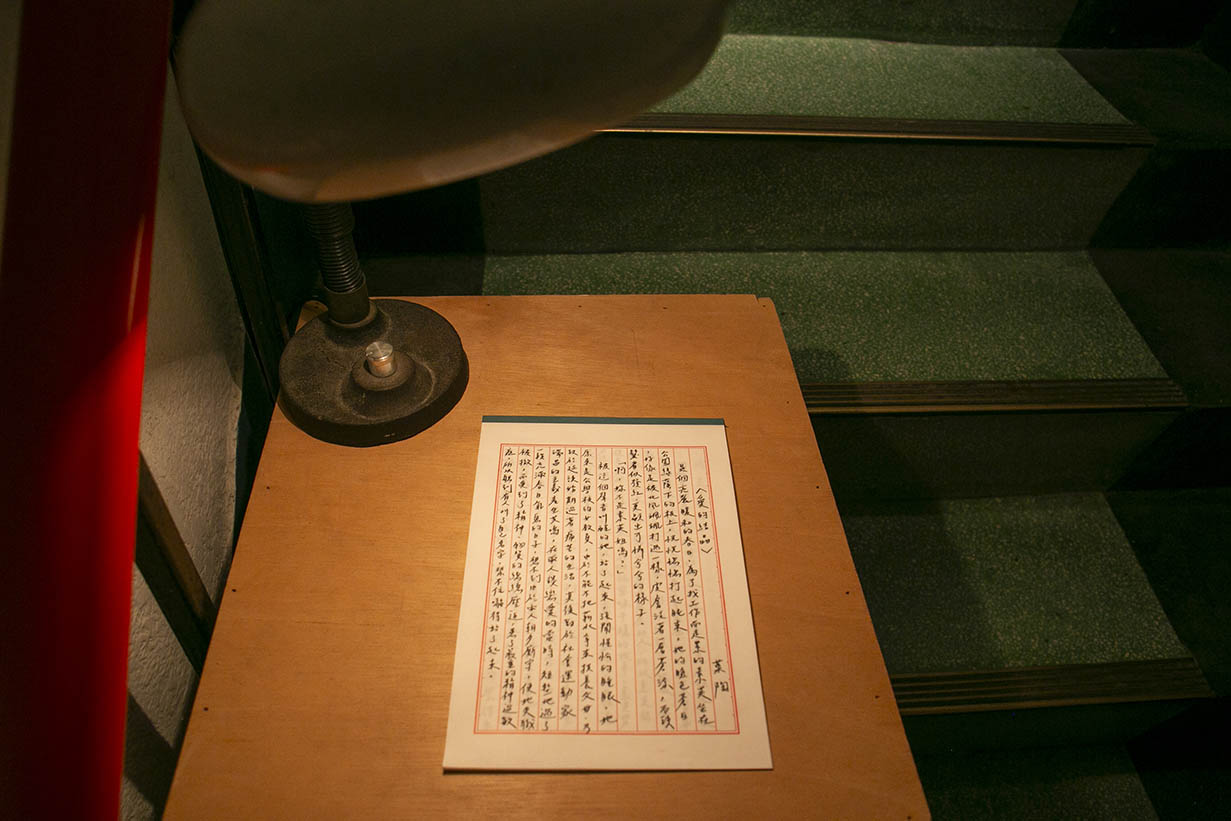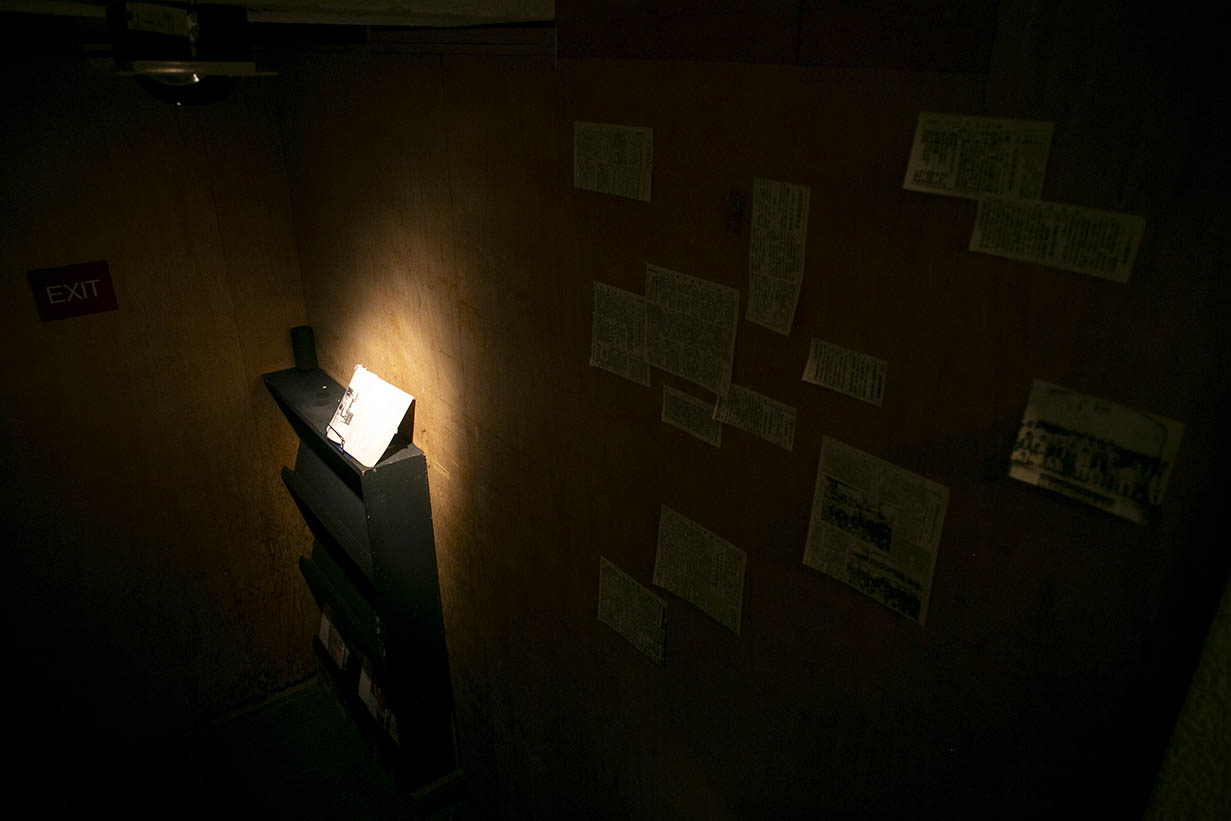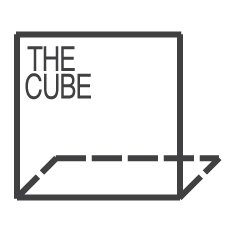For the first event in the Year of the Dragon, TheCube is pleased to collaborate with Yeh Hsing-Jou to present The Foolish Old Man Removes the Mountains: The Sounds and Images of Yang Kui, an exhibition that includes installations, lecture performances, videos, and documents. This exhibition explores the historical process of “media transformation” in the literary works of Taiwanese veteran writer Yang Kui into music, songs, and concerts. This collaboration originates from TheCube Project Space’s exhibition project Sound Meridians initiated in 2020, focusing on how culture is transmitted and flows through sound, and how sound culture serves as a medium and material of historical topology to reflect the unique history and cultural features of a place. Following its exhibition in 2020 at the Museum of Contemporary Art Taipei, Sound Meridians continues to expand into several online exhibitions. The Foolish Old Man Removes the Mountains: The Sounds and Images of Yang Kui, curated by Yeh Hsing-Jou, started from her online exhibition The Foolish Old Man Removes the Mountains: The Sounds and Images of Yang Kui in the 1990s to further explore its historical depth and transform it into a curatorial initiative of a physical exhibition, presenting the archive and the works of three artists in response to the theme. The exhibition aims to offer the audience a multi-faceted form to reacquaint themselves with the works of Yang Kui and his influence on contemporary creation.
About the exhibition
Around the end of the 1970s, Yang Kui (1906-1985) re-emerged as “an old writer who had fought against the Japanese colonial regime.” He broke his silence since his decades on Green Island as a White Terror prisoner, publishing his early fictions, memoirs, and dialogue with contemporary society. One of these texts is an essay “Sing Our Own Songs” echoing then Campus Folk Song movement. In this essay, Yang Kui confessed how songs in his seventy-year-long life have always sung the voice of ruling classes and thus served as “the Other,” so that he’s been a tone deaf since childhood. Not until 1977 did he finally opened his ears on hearing “Wild Chrysanthemums in Autumn,” a song contributed to him by the band Vernacular Quartet. In the same year, Yang Kui paraphrased his poem “Three Cobblers” (1976) into “The Foolish Old Man Removes the Mountains” after Li Shuang-tze tried to make it a song. Yang Kui’s versification not only ”Sings One’s Own Song” but also “Let Literature Lyre (Make Literature Sing).” Meanwhile, lots of guests visited Yang Kui’s Tunghai Garden and left us with many photos of Yang’s everyday life. Besides these optical portraits, there appeared two important portrayals in other media: one is Wen Ting-Shu’s woodcut print of Yang Kui (1974) on the cover of China Tide magazine (1977); the other is a literary biography, Portrait of Yang Kui (1978) written by Taiwanese Literature scholar Lin Juei-Min.
Yang Kui’s sight and sound flowed over the papers and pages since the late 70s, and the tide arrived in America in the early 80s. In 1982, Yang Kui was invited to International Writing Program at the University of Iowa. During Yang’s two-and-a-half months stay, several important works showed up to salute him. Dr. Sim Ti Lim composed a song based on Yang’s short story “The Indomitable Rose.” Film director Huang Mingchuan, then a photographer, took a unique photo of Yang Kui Cuddling a Cat. Besides, there was a precious tape recording of Yang Kui speaking up to Taiwan literature and history. The adaptation, translation, and the media-crossing representation of Yang Kui’s works from the late 70s stored up and spread out as fertile soil for the coming generation. At the beginning of the 90s, the field of Taiwan literature witnessed the first wave of “medium-turn” centered on Yang Kui and his works. One key example is the musical album Yang Kui: Mother Goose Gets Married released by Crystal Records (1993), a record company that amplifies the silenced voice of Taiwan. The other is a literary documentary on Yang Kui (1997) directed by Huang Mingchuan and commissioned by Avanguard Publishing House, a publisher devoted to the erased Taiwanese Literature.
Inspired by the plural form in Yang Kui’s poem “The Foolish Old Man Removes the Mountains,” in which “Man” summons “Men” thus implies the agency of “the multitude”(in Antonio Negri’s sense), this exhibition The Foolish Old Man Removes the Mountains: The Sounds and Images of Yang Kui take multiple routes from Yang Kui’s legacy: from Yang Kui to his comrade and wife Yeh Tao, from Yang Kui to his son and successor Yang Jian, from audio-visual representations of Yang Kui to a series of long-ignored issues, such as writing and translation, play-reading and performance, women’s movement and social movement, labor and land, moving images and oral portrayal, singing or chorus and collective memory, etc.
This exhibition The Foolish Old Man Removes the Mountains: The Sounds and Images of Yang Kui is a follow-up and extension of the on-line exhibition The Foolish Old Man Removes the Mountains: The Sounds and Images of Yang Kui in the 1990s in Sound Meridians initiated by TheCube Project Space, aiming to trace back to the 80s and up to the 60s, and attempting to dig up Yang Kui’s cornucopia legacy in contemporary Taiwan society through artists’ creation and articulation.
To articulate in archive, and to crack up spaces for conversation through creation, this exhibition installs and invents an opening and flowing (social) milieu, mirroring the idea of “Street Theater” proposed by Yang Kui when he was in the White Terror prison on Green Island:
Street Theater sets the stage on a small square surrounded by the crowd, so an actor would walk in-and- out through the audience and get along with people, and become one with the people. Thus it will most effectively reach and touch the audience with the main idea of the play.
— Yang Kui, “On Street Theater” (1956~, New Student’s Notebook[I])
Exhibited works
Li Tzi-Mei
What Are The Songs The Foolish Men Sing?
2024
Sound file, Activists’ photos and prose, audience participation
Yang Kui joined the Taiwanese Cultural Association in 1927. In the same year he participated in the Peasant Movement and hence devoted himself to organizations of the People and writing for the People. His poem “Three Cobblers” (1976) was later adapted into lyrics “The Foolish Old Man Removes the Mountains,” which was sung along with “Ilha Formosa” by Li Shuang-tze in “Sing Our Own Songs” movement.
Both the lyrics of “The Foolish Old Man Removes the Mountains” and the Folklore Movement address Yang Kui’s belief: land and culture are for the People. Around 2010, I had heard the song “The Foolish Old Man Removes the Mountains” sung in the march of land justice campaign and environmental movement. It caused me to ask that, like all laborers, old foolish man sings when laboring. If we are to “Sing Our Own Songs,” what songs would the foolish men chant? And which mountains has he/she (re)moved?
Through my process of artistic creation, I reflect on these questions and long for your responses. In this work, I interview activists in land and environment movements from the 1980s to the present to know the resonance the song has evoked in them, and I turn them into a sound piece. This work also invites the audiences to write down their responses. Songs, sounds, voices, and collective memories interweave into the fruits of labor, which is multi-time-space while the foolish men have (re)moved mountains in-between years.
- Artist, Interviewer and Researcher: Li TziMei
- Co-creator of Hand-Drawing: Su Wei-Hsuan
- Special Thanks: participants and supporters of land justice and environmental movements
Dawang Yingfan Huang
Reciting Yang Kui’s Japanese translation of Lu Xun’s “The True Story of Ah Q”
2024
Lecture performance, 30 min
Why did Yang Kui translate “The True Story of Ah Q” (1921) from Chinese to Japanese?
From Japanese colonization to China’s Civil War, like then other intellectuals, Yang Kui was anxious about the future of island Taiwan and Mainland China. His poem “In Memory of Lu Xun” (Oct., 1946) both in Japanese and Chinese, published at the tenth anniversary of Lu Xun’s death, witnesses to the influence of Lu Xun(1881-1936) on then Taiwanese literary field and cultural circle. One accepted reason why Yang Kui translated Lu Xun’s “The True Story of Ah Q” is that, the 1920s translation by 井上紅梅 Inoue Kōbai (1881-1949), who self-claimed “China Hand,” actually deviates from Lu Xun’s original. Though there exist two earlier Japanese translation, one by literary master 佐藤春夫 Satō Haruo (1892-1964), the other by Lu Xun’s disciple 增田涉 Masuda Wataru (1903-1977), Yang Kui still longed for a version “from Taiwanese perspective.”
This lecture performance, through reciting Yang Kui’s translation of “The True Story of Ah Q,” re-endows the characters with a new life, so as to explore Yang Kui’s practice as a translator, a writer, and a dissident.
*NOTE: After the second World War, Tunghua Books Company invited Yang Kui to edit “Chinese Literature Series”: six volumes in total, Chinese original and Japanese translation bilingual-layout. Yang Kui translates Lu Xun’s “The True Story of Ah Q” (published in January,1947), Mao Dun’s “Story of the Big Nose,” Yu Dafu’s “Weixue de zaochen”(Dim Snow at Dawn), and Zheng Zhenduo’s (Cheng Chen-tuo) “The Last Days of Huang Kung-Chun.”
- This lecture performance will be held at 3pm on April 13, 2024.
Liu Chi-Tung
Lady Riot
2024
Documents and Songs
I came across Yeh Tao (1905-1970) when searching for and studying on Taiwan White Terror archive. At first, I regarded her merely as Yang Kui’s wife and a political prisoner’s relative. Later, I found myself limited within a narrow view. Actually, Yeh Tao is a revolutionary under the Japanese Colonial Regime and Postwar KMT Martial Law. She is one of the leaders of Union of Taiwanese Peasant (UTP) and good at public speech. She was arrested by Japanese police at the morning of her wedding, and thus a bride behind bars. She is a fighter singing folklore in death prison of 228 Accident.
However, when listening to “Flower Seller Granny,” a song compiled in the musical album Yang Kui: Mother Goose Gets Married, I realized that, despite her lavish life, Yeh Tao is still narrowed down and transformed into a shadowy and silent woman under the patriarchal society and male-dominant ar- chiving. Thus, I attempt to portray the radical face and rich façade of Yeh Tao in her life. With Taiwanese female figure, I’m familiar with, my work recomposes the text, rewrites the lyrics, and re-sings the song. By connecting the outer and the inner corridor of the exhibition space, this work imagines a female body rushing to-and-fro between domestic domain and social space.
Author of the adapted lyrics: Li Chao-kuan
Singer: Wu Su-yueh
Special Thanks: Tsai Wan-shuen, Li Chia-hsiu
Curator and Producer
Hsing-Jou Yeh
YEH Hsing-Jou Freelance art worker. Her research focuses on art history in 1990s Taiwan and the methodology of D.I.Y. and independent production during then. Besides, her research focuses on the literacy of art documentaries as art archives. Recent research project: The Spectrum of Noise Activation in the 1990s: Starting with Artistic Practices of Zhou Yi-Chang, Huang Mingchuan, and Fujui Wang Commentary Project (supported by 2022 Visual Arts Criticism Grant, National Culture and Arts Foundation); The Foolish Old Man Removes the Mountains: The Sounds and Images of Yang Kui” Archive Research & Exhibition Project (2023-2025). She had been the representative of ET@T Lab Theater, and she is now studying in the School of Fine Arts, Taipei National University of the Arts.
Artists
Li TziMei
Li is a Taiwanese Sound Worker, Electronic Music Composer, Theater Sound Designer, DJ, and Cultural Activist. Li is the founder of “Midnight Sound Maker Studio,” promoting Taiwan electronic music and sound, redeeming and reclaiming human being’s auditory sense. Li’s works often take the form of field recording and mixing of the traditional and the electronic, creating a world of rich narrative sounds. In recent years, Li had run several sound projects: “Freeze Historical Reverberations: An Auditory Narratives of Caves in Taiwan,” “Psyche-Delics–The Ear of Psilocybin: To Listen to Our Minds,” “Electronic Taiwan Folk Music,” and “Sounds Like Sound–Stone, S-Tone.” Li’s works are exhibited or practiced in New Taipei City Art Museum, C-LAB Taiwan Sound Lab and many music festivals.
Huang Dawang
As a self-taught bedroom musician, Dawang began his “music career” since mid-teen, and left many bedroom recordings unreleased. After returning from a five-and-half year stay in Osaka, Japan with more recorded items, with experience of sessions and live performances at underground music scenes in Kansai, he has been known as an oddball of outsider music at Taipei’s underground scene, and been invited and commissioned to perform at various events. Among his music projects, “yingfan’s Blackwolf Nagashi” project which combines comedy songs and storytelling is best known as his lifework, the rest include free music, sound collage works and power electronics, He also active as performing artist, actor, visual artist, writer, Japanese-Mandarin translator.
Liu Chi-Tung
Graduated from the Graduate Institute of Trans-disciplinary Arts at the Taipei National University of the Arts. LIU currently works as a full-time artist. In 2022, she received accolades such as the Taipei Art Awards, the 21st Taishin Arts Award——season nomination, and the Nanying Award. Her practice primarily focuses on seeking the punctums in the scenes of daily life and performing actions that pierce them. In recent years, LIU has paid attention to the invisible places beneath the modern facilities, such as rivers and sewers in urban areas, rivers and reservoirs in valleys, and coastlines and harbors of islands. Through the mediums of video, text, sculpture, installation, and project-based art forms, she traverses horizons and the boundaries between the surface and depths of water, exploring the fractures between the landscape beneath her feet and the language that continues to exist. Her work delves into recollections of forgotten memories and reflects upon the relationship between oneself and the surroundings.
Production team
- Curator & Producer | Yeh Hsing-Jou
- Artists | Li Tzi-Mei, Dawang Yingfan Huang, Liu Chi-Tung
- Key Visual | Dawang Yingfan Huang
- Exhibition Design | Yeh Hsing-Jou
- Design Coordinator (Archives Section) | Chan Ming-Fang
- Technician | Lee I-Ting
- Carpentry | Hsu Tsung-Jen, Liu Chi-Yi
- Printing Production | Dong Fun Advertising Co., Ltd.
- Photography | Lin Yu-Quan, Jason Lee
- Archives Courtesy | Chu Yueh-Hsin, Wu Sheng, Eason Lee Kun-Cheng, Lee Min-Yung, Lim Sim Ti, Lin Lianche, Chen Chun-Chieh, Huang Mingchuan, Shiao Fu-Tr, Wild Fire Music, Yang K’uei Culture and Education Association, NTU Center for the Arts, Iowa Digital Library (International Writing Program, University of Iowa)
- Special Thanks | Jen Chiang-ta, Chu Yueh-Hsin, Huang Mingchuan, Ho Yingyi, Wen Ting-Shu, Yang Tsui, Freshfen Liu, Chen Yun-Yuan, Chen Chia-Chi, Huang Chien-Hung, Manli Culture Studio, Crystal Records, Avanguard Publishing House, Yang K’uei Culture and Education Association, Wild Fire Music, Fisfisa Media, PIGHEADSKIN MUSIC, trees music & art, Yang Tsu-Chuen, Kuandu Museum of Fine Arts, Taipei National University of the Arts, National Yang Ming Chiao Tung University Library (Yang Ming), Graduate School of Taiwanese Culture, National Taipei University of Education, Halfway Cafe, YouHeBook
Curated & Produced by Yeh Hsing-Jou
Artists | Li Tzi-Mei, Dawang Yingfan Huang, Liu Chi-Tung
Exhibition Date | 2024.03.16 – 05.19 (Wed to Sun, 14:00 – 20:00)
Closed on 04.04 – 04.05
Venue | TheCube Project Space (2F, No.13, Aly 1, Ln 136, Sec 4, Roosevelt Rd, Taipei)
Opening | 2024.03.16 (Sat) 15:00 – 18:00
Exhibition events
- Lecture Performance by Dawang Yingfan Huang — Reciting Yang Kui’s Japanese translation of Lu Xun’s The True Story of Ah Q
2024.04.13 (Sat) 15:00 - Documentary film Yang Kui (1997, Avanguard Publishing House directed by Huang Mingchuan) — screening and talk
Host / Speaker | Chen Chia-Chi
Attendee | Huang Mingchuan
2024.04.20 (Sat) 14:00-16:30
TheCube 7F (7F., No. 241, Sec. 3, Roosevelt Rd., Taipei) - Closing Concert, performance by Chu Yueh-Hsin
2024.05.19 (Sun) 19:00-20:00
Co-organizer | TheCube Project Space
Sponsor | National Culture and Arts Foundation
Category:
Date:
2024 年 3 月 6 日

